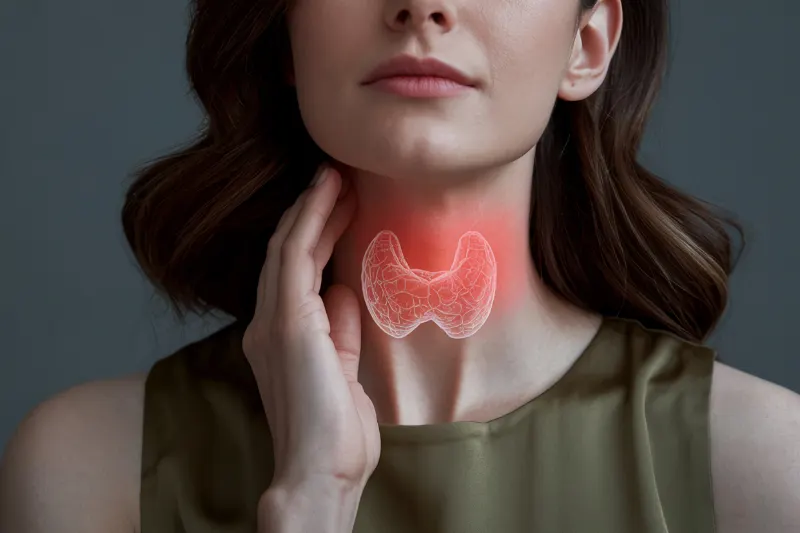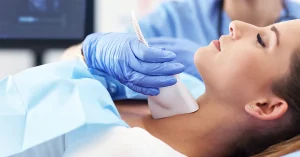Medical Procedures
Thyroid and Parathyroid
- Thyroidectomy + Lymphadenectomy
- Subtotal Parathyroidectomy
Neuroendocrine Tumors
- Pancreatic Neuroendocrine Tumor Removal
Adrenal

Thyroid hormones influence heart function, body temperature, weight, energy levels, and even mental health.
Any functional imbalance or structural change in this gland can affect the entire body, causing various symptoms that are sometimes difficult to directly correlate with thyroid disorders.
Book an Appointment
What is thyroid lobectomy?
Thyroid lobectomy is an endocrine surgical procedure that removes a single lobe of the thyroid gland (right or left), along with the isthmus—the central portion connecting the two lobes. Unlike total thyroidectomy, this procedure preserves part of the thyroid tissue, which can allow normal hormonal function to be maintained without the immediate need for replacement therapy.
At the VenArt Clinic, this procedure is performed by a team experienced in endocrine surgery, using modern techniques that reduce risks and promote rapid and safe recovery. The procedures are carefully planned, individualized according to each patient’s pathology, and followed by continuous postoperative medical supervision.
When is thyroid lobectomy recommended?
Thyroid lobectomy is recommended in the following cases:
- Solitary thyroid nodule, suspicious or benign, located in a single lobe;
- Small papillary thyroid carcinoma (microcarcinoma) with limited localization;
- Unilateral goiter causing pressure on the trachea or esophagus;
- Localized hyperthyroidism, such as toxic adenoma.
What are the advantages of the intervention?
- It is less invasive than total thyroidectomy;
- It allows part of the gland to be preserved, maintaining thyroid function;
- It reduces the risk of requiring long-term thyroid hormone treatment;
- It is performed through a small incision in the neck, with good aesthetic results;
- Recovery is rapid, with many patients being discharged on the same day.
Many patients express concern about the scar resulting from the procedure. Currently, the minimally invasive techniques used at the VenArt Clinic allow for a small incision with very good aesthetic results.
In addition, surgeons are trained to avoid damaging nerve or vascular structures in the neck area, which contributes to a complete recovery without functional complications.
How are conditions requiring lobectomy diagnosed?
Before recommending lobectomy, the specialist performs a series of investigations to assess the nature and exact location of the lesion:
- Thyroid ultrasound to identify and characterize the nodules;
- Fine needle aspiration biopsy (FNAB) to determine benignity or malignancy;
- Hormone tests to assess thyroid function (TSH, FT4, T3);
- Thyroid scintigraphy, in the case of hyperthyroidism, to detect active (toxic) nodules.
Before the procedure, the patient is informed about all stages of the procedure, from preoperative preparation to postoperative care. It is essential to have a clear discussion with the surgeon to understand the reasons for recommending a lobectomy, the expected results, and any alternative treatments.
At the VenArt Clinic, patients benefit from interdisciplinary consultations, which also involve the endocrinologist, in order to provide a comprehensive and tailored approach to each case.
It is also recommended that general tests (complete blood count, coagulation profile, biochemistry) be performed to check the patient’s overall health. It is important for the patient to mention any ongoing medication, especially anticoagulants, which may need to be adjusted.
Life after lobectomy: monitoring and checkups
After surgery, it is important to monitor thyroid function. In the first few weeks after surgery, the patient will undergo hormone tests to assess the activity of the remaining lobe. In cases where thyroid hormone levels remain within normal limits, levothyroxine or other replacement hormones are not necessary.
Regular check-ups include clinical evaluations, follow-up ultrasounds, and sometimes repeat punctures if new nodules appear. The doctor will closely monitor the evolution of the scar and any possible changes in the patient’s voice or general condition.
At the VenArt Clinic, patients receive detailed information and personalized support before and after the procedure to ensure a safe and complication-free recovery. The multidisciplinary team is prepared to respond promptly to any situation that may arise, providing careful monitoring and constant support during the postoperative period.
Schedule an appointment
If you have been recommended for a thyroid lobectomy or are experiencing specific symptoms, we encourage you to schedule a consultation. We will evaluate your case and offer you the best treatment options.
Medical Team
Frequently Asked Questions
Are there any risks associated with thyroid lobectomy?
Like any surgical procedure, lobectomy may involve certain risks, such as bleeding, infection, or temporary voice changes caused by possible damage to the laryngeal nerves. However, such complications are rare, especially when the procedure is performed by an experienced team.
Is thyroid hormone treatment necessary after surgery?
In many cases, hormone replacement therapy is not necessary because the remaining thyroid lobe can produce sufficient hormones. The decision is made based on postoperative hormone levels and the patient’s clinical progress.
What are the symptoms that indicate the need for surgery?
Symptoms vary depending on the condition, but may include:
- Enlarged neck or nodules in the thyroid gland;
- Weight loss or excessive weight gain;
- Palpitations, excessive sweating, anxiety (in hyperthyroidism);
- Frequent fractures or bone pain (in hyperparathyroidism);
- Severe hypertension (in adrenal tumors).
Consult a specialist for a correct diagnosis.
How long does recovery take after a lobectomy?
Recovery is generally fast. Most patients resume their normal activities within a few days, and complete healing occurs within a few weeks, with minimal restrictions. Patients are encouraged to avoid strenuous physical activity for the first 10–14 days, but can resume normal activities after 48–72 hours.

